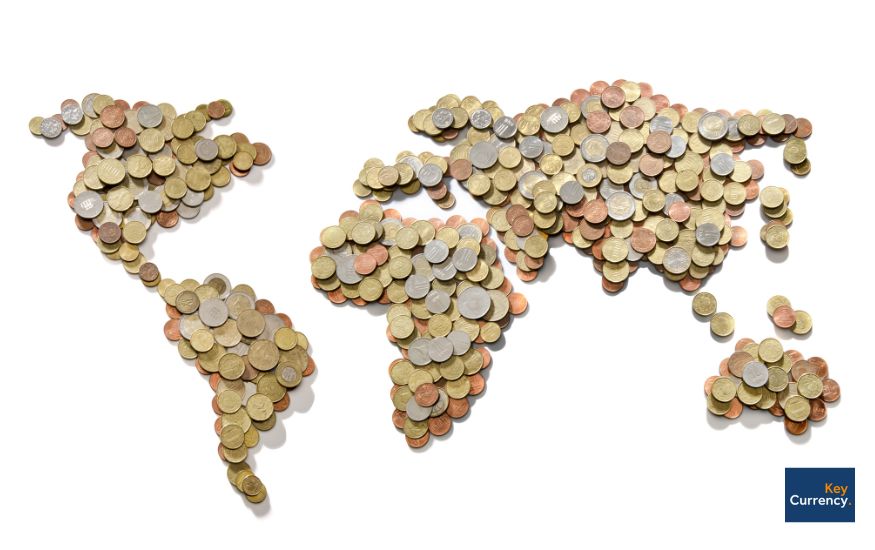 Author, Andrew Gibson
Author, Andrew Gibson
Last Updated on August 27th, 2024
If you inherit money from overseas, you are probably worried about the tax and how to transfer the money safely into your bank account without much hassle or cost.
Below I’ll give you a summary in plain, jargon-free English!
How do I transfer money from overseas inheritance?
It’s not complicated. I promise.
The best way to transfer inheritance from overseas is to use an international bank transfer.
It’s safe, quick (takes a few days) and cost-effective.
An international bank transfer, as the name suggests, is when you send money from a bank account located in one country to another bank account located in a different country.
To be clear – you don’t need to set up a new bank account in a foreign country.
Your inheritance will be converted into the currency you want as part of the international bank transfer and then sent directly to your existing bank account.
You can carry out an international bank transfer using a bank or money transfer service.
Using a bank might seem convenient, but a money transfer specialist will typically be a lot cheaper, more helpful, and more efficient.

How much will it cost me?
There is no standard cost to sending money internationally.
As a ballpark, big banks typically charge in the region of 3-5% of the money you transfer.
This will be a combination of fees and exchange rate charges, just to make things difficult.
It can get tricky to tally up the various fees of different providers, so it might be easier just to find out how much money you will receive at your end and compare that figure.
The highest number is the best.
The alternative to a bank is a money transfer service.
The most obvious benefit of using a money transfer service is it tends to be a lot cheaper than banks on fees and changes. They wouldn’t exist otherwise.
The downside is there is a little bit more setting up at the start. A good money transfer service should do most of this work for you.
Both banks and money transfer companies tend to set their exchange rates based on how much you send.
The larger the sum, the better the exchange rate. I think the fancy term for that is a sliding scale.
Broadly speaking, you can expect to save 60-70% in overall charges using a money transfer specialist instead of a bank.
How to choose a money transfer company
Having been on your side of the fence, I know it can be confusing trying to decide which money transfer company to choose.
One thing you need to know from the outset is that a lot of money transfer companies these days are just ‘apps’ you download on your phone. This may not be ideal for someone receiving an overseas inheritance.
The reason is that money transfer apps offer no human help. They’re kind of like a ‘do-it-yourself’ service.
The main money transfer apps are Wise, Revolut, PayPal, Venmo, Zelle, Remitly, and WorldRemit. They all do pretty much the same thing.
If anything goes wrong, it can be difficult to resolve the problem because you can’t speak to anyone. It’s all via webchat or email.
I guess that most people receiving inheritance don’t need any more stress in their lives. They just want it done right.
In my experience, money transfer apps are better suited to small remittance amounts or for those who just love playing around with new technology (usually someone under the age of 30!).
For inheritance payments, you are best using a money transfer company with human support.
Most people receiving inheritance from overseas want to know if their international payment is set up correctly, the exact amount they will receive, and when they will get it.
Don’t forget that the timing of your currency exchange can be an important decision too.
Exchange rates and timing
Day-to-day, exchange rates move every few seconds.
Even small movements in currency values can make a big financial difference to the value of your inheritance, particularly for larger sums.
At Key Currency, we’ve dealt with inheritance payments of all sizes and from dozens of different countries.
We will work to get you the best conversion rates, avoid losses, and reduce costs.
And whilst we’re specialists in this area, we appreciate you may not be.
That’s why we will always explain the options available in straightforward, jargon-free language.
Inheritance distribution
One thing I know has helped customers is we can accept inheritance proceeds directly from the solicitor or executor and even distribute the inheritance money to multiple beneficiaries should you wish.
Note: To open an account with a money transfer company you need to be over 18.
So if the beneficiaries in the will are children, an adult would need to receive the payment from overseas and then distribute the inheritance money.
What information do you need to provide?
Whether you use a bank or money transfer company, you will need to provide some ID before the money is sent.
It’s not because you are a suspected drug lord.
It’s because there are global anti-money laundering rules (serious stuff) that must be adhered to.
For inheritance payments, the paper trail is pretty obvious, so it’s normally quite straightforward.
In most cases you will need to provide:
- Proof of identity (passport)
- Proof of address (a bill)
- Source of funds (will probate – a solicitor will provide)
These can be emailed over as a photo or scanned. Once received, you should be in a position to transfer money within an hour or so.
Inheritance tax (a quick overview)
Receiving inheritance money from overseas may trigger inheritance taxes.
Inheritance taxes differ all around the world and like all taxes, there are usually little exemptions and nuances that make them complicated.
Generally speaking, inheritance taxes are imposed in the country in which the money or assets are located, not where they are received.
Sometimes inheritance tax is imposed on the estate and sometimes on the beneficiaries.
Because inheritance tax can be complex, I would lightly nudge you to pay an accountant to do your tax return. It’s not worth the risk of getting things wrong.
Here’s a brief overview of the inheritance tax rules in different countries:
United Kingdom
Inheritance tax is only payable if the deceased was domiciled in the UK or if you were left assets within the UK.
The deceased was domiciled in the UK if the either lived in the UK for 15 of the last 20 years or had a permanent home in the UK at any time in the last 3 years of their life.
If their permanent home was abroad, inheritance tax is only paid on their UK assets (e.g. property or bank accounts located in the UK).
No inheritance tax is due if the estate is below the £325,000 nil-rate band or if the money is left to a spouse/civil partner or charity.
If you’re a child or grandchild, the nil-rate band increases to £500,000.
The standard tax rate is 40% of any amount above your nil-rate band.
You still need to report your inheritance to HMRC if you are above or below the threshold.
Ireland
If you are a resident of Ireland, you will be subject to the Irish Capital Acquisitions Tax on the inheritance you receive from abroad.
Like the UK, Ireland has a tax-free threshold, and payments to a spouse/civil partner are exempt from inheritance tax.
For children, the threshold is €320,000. For siblings, it’s only €32,500. And for all other cases, the threshold drops to €16,250.
USA
If you are a US citizen and receive an inheritance from overseas, there are no taxes imposed by the IRS (Internal Revenue Service), but if the amount exceeds $100,000 you need to report it (Form 3520).
Australia
I need an easy one, so here it goes. Australia has no inheritance tax. You beauty.
Canada
There is no inheritance tax in Canada either. Nice one.
Quick Summary
- An international bank transfer is the best way to transfer money from overseas inheritance because it’s safe, quick, and cheap.
- You don’t need to open a bank account in the country where you receive inheritance. A bank or money transfer company can send the money directly to your account.
- Money transfer companies are usually a fair bit cheaper than banks and are easier to deal with.
- For inheritance payments, it’s best to use a money transfer company that can provide human help and guidance.
- Every country has different rules on inheritance tax. It can get quite complicated, as sometimes the estate pays the tax, and sometimes the beneficiaries. Best to use an accountant.
At Key Currency, we have helped hundreds of people receive inheritance from many different countries. Our experienced team will deal with your inheritance payment sensitively and professionally. Unlike most money transfer companies, we provide one-to-one service, meaning you will be looked after by the same person from start to finish. As part of our service, we will work with you to achieve the best possible exchange rates on your foreign inheritance and help you avoid paying high bank fees. With highly competitive exchange rates and no fees added, we provide a money transfer service that has a Trustpilot rating of ‘Excellent’, from over 2,500 customer reviews. Contact us today and request an exchange rate quote for free so that we can help get you started with your overseas inheritance!
More money transfer guidance…


